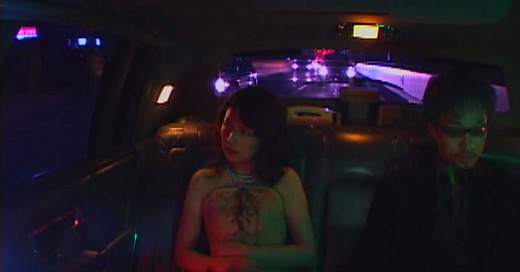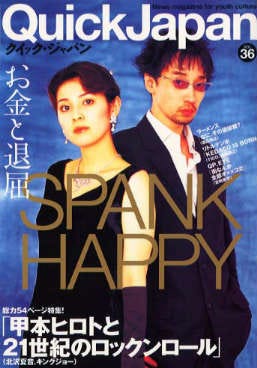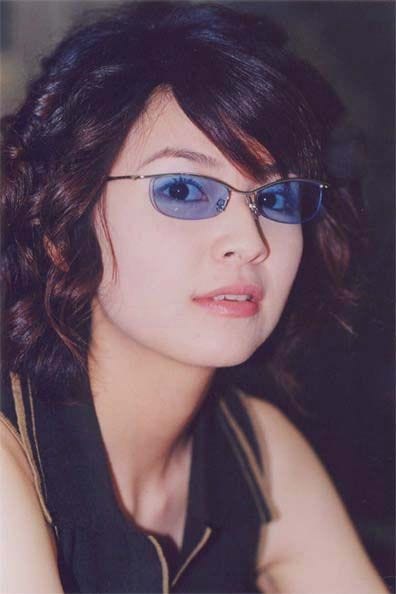Back in December, Spank Happy’s catalog was made available on streaming services, and my world has felt a little uncanny ever since. The albums that have lived for years on my shelves, some of my most cherished private pleasures, now have a new and sparkling celestial home in the cloud, free of dust bunnies and all the earthly imperfections of my caretaking. Any number of terrible disasters might befall me tomorrow and I could still be reunited with them in a matter of seconds.
It’s nice at least to imagine Spank Happy in heaven, suspended among the digital angels. Forged from the ashes of the band’s original 1992–1997 incarnation, a three-piece jazz pop ensemble made up of Kikuchi Naruyoshi on saxophone, Kono Shin on keyboards and Hara Midori on vocals, by the eve of the new millennium Kikuchi had found himself the only remaining member of the group following his sudden diagnosis of necrotizing lymphadenitis, a rare autoimmune disease that kept him hospitalized for part of 1998. Coming out on the other side of a near-death experience that left him weighing all of 84 pounds at the time of his discharge, he veered off the rails of his respectably outré career thus far and towards sticky-sweet, arsenic-laced ‘80s pastiche. There would be choreography and pantomime.
He was 36 years old, possibly on the edge of a midlife crisis, and visited by a muse in the form of 19-year-old office worker Iwasawa Hitomi, a friend of friends who encouraged her to audition for the now-vacant position of vocalist. A beautiful novice singer whose knowledge of music only skimmed the surface of the hit charts, she acted as the impassive vessel for his satire of what he called “the bloated desires of the Bubble period” from 1999 until their abrupt disbandment in 2004.
In the twenty years since, Spank Happy has existed as a cult figure in the margins of Japanese pop, covered by alt-idol vanguards BiS and cited as an inspiration by the likes of Soutaiseiriron and Urbangarde. But they’ve still never managed to transcend the double-edged mantle of being “your favorite artist’s favorite artist,” particularly among Japanese music enthusiasts overseas, where news of their revival made nary a ripple compared to the waves seen in domestic circles. Obscurity, I suppose, breeds more obscurity. It is, as musician Kotetsu Shoichiro wrote for a roundtable discussing their influence in Tower Records’ news publication Mikiki, “an era when we can fall under the delusion that music not on streaming services never existed in the first place,” that our intimate relationships with these songs are unquantifiable by Spotify Wrapped and thus wholly imaginary. “Until now, whenever I wanted to get someone to listen to Spanks, I’d force upon them one of the used CDs I bought for my stockpile every time I came across them in a thrift store, all covered in fingerprints.”
I would’ve appreciated the gesture. For a long time, I got by on pirated albums encoded at 128 kbps and whatever I could scrounge from YouTube, slowly collecting the out-of-print discs when and where I could, each deep cut I’d never heard before vivid and precious. Commercial failures then and now, they more or less all go for chump change, but the crown jewel of their discography ironically never bore their name in the metadata until the limitations of streaming made that the only sensible choice. “Futsuu no Koi (Ordinary Love),” a twisted bit of AOR branded as a Kikuchi solo release featuring vocals by Iwasawa for its stark divergence from their typical sound, fetches upwards of 10,000 yen on the secondhand market, sometimes tagged with meiban — famous or masterpiece recording — as if to justify the price. It’s this nine-minute ode to conventional romance in the shadow of abject trauma, devastating and funny and relentlessly sincere, that has come to define their legacy among modern listeners, and it was the song Mikiki’s editors knew to invoke in their headline: “The Lives Turned Upside Down by Spank Happy and ‘Ordinary Love.’”
Of course, I count my own among those lives. I remember being flush with pandemic-era stimulus cash and coming up on my 30th birthday when I waged a bidding war for a copy of it from my bed, a decade of fandom distilled into one impulsive purchase, nerves still electric with the rush of conquest long after the seconds on the timer had ticked down to zero. The version of this song I’d adored ever since I used to come back to my shitty dorm room to listen to it after class had been compressed and degraded for the kind of furtive, borderless exchange Kotetsu’s method could’ve never accomplished. When I lifted the CD out of its scratched jewel case and spun it for the first time, the lushness of the instruments, their crisp definition, sounded to my ears like the sonic weight of the money I’d laid out for the privilege.
It would all have continued to feel like an unusually persistent fever dream to me, the instant gratification of app-based access and music videos materializing on YouTube in higher definition than I’d ever seen them in my life, if not for the phantom escaping into the real world, drawing a crowd of hundreds just to hear the voice of a ghost. Iwasawa has been untraceable since Kikuchi’s last contact with her in 2008,1 but in-person retrospective events celebrating the 25th anniversary of their creative union have been sold-out affairs. “Can there really be a line out the door for Spank Happy in the Reiwa era?” wondered one attendee of the most recent event held at Daikanyama Unit, musing on the strangeness of gathering in public to dance and rejoice to “the songs I used to listen to on repeat as a student to escape reality.”
I don’t often long for something as impractical as a cramped gig on the other side of the globe, but these parties have gotten to me. Still, I “attended” one in spirit, last month’s Dommune livestream, half-awake in my cruel time zone for the premiere of the last piece of music any of us will ever hear Iwasawa sing.
The rediscovered Spank Happy tapes that made their discography’s release on streaming possible also included “Ethic,” a botched cut from the recording sessions for Vendôme, la sick Kaiseki (2003), their second and final album, that Kikuchi had thought to be lost. The album’s closing track, he said, was meant to be a cover of Inoue Yosui’s “Senaka Made Yonjuugofun (45 Minutes to Your Back),” made famous by Sawada Kenji. It was the night before they were due to submit the album to their label, and he and Iwasawa were holed up in the studio on little sleep, trying unsuccessfully to make the song work. “Ethic” became their fall plan, a rough soundalike that Kikuchi wrote “in a few hours with one eye on the clock,” but there wasn’t enough time. The song was unfinished, the arrangement too perfunctory to rise above the level of a demo. Iwasawa, who rarely understood Kikuchi’s lyrics as written and needed most of them copied into hiragana to be able to sing them, misread a word, a trivial mistake that nonetheless rendered her take unusable.
We have so many tools to raise the dead now. Last year’s machine-assisted restoration of “Now and Then,” a demo long thought unsalvageable, made a foursome of the Beatles again, John Lennon’s voice reaching us from some faraway place. “It’s not some sort of cynical marketing exercise to try and push catalog sales,” producer Giles Martin told Variety. “I love the fact that it’s Paul just having the cassette in his possession and… I think he just misses John and he wants to work on a song with him. It’s just as simple as that.“ What Kikuchi and Iwasawa left behind of “Ethic,” too, was corrected using AI, seamlessly smoothing over whatever small human error had marred Iwasawa’s take for the benefit of an audience she never knew would be listening. I can’t describe how my breath caught to hear those first piercing strains of her voice, that fragile soprano that has always sounded to me like glass made into music. But I do believe he misses her. It’s why this song made it out alive.
If there was any reason why I didn’t cry all over again when I gave “Ethic” a second listen after its formal release a few weeks ago, it’s because I had, in a random turn of events, already exhausted my store of tears while listening to Okada Yukiko’s posthumous singles collection All Songs Request. April marked the anniversary of her suicide at 18 years old in 1986, and
from had reached out to me about a piece he was writing in response to it.2 As soon as I read his message, I had to pull it out of my closet and wipe the grime from her trademark smile.“Sayonara Natsuyasumi (Goodbye Summer Vacation)” opens the record like a cheap trick on my emotions: pinky swear to never love anyone but me. The spoken interlude I’d forgotten on “Lonesome Season” — I still love you, whisper-soft — sounded for all the world to me like a message from the other side. How can it be that idol songs are written to function better in death than they did in life? Minamino Yoko, a friend and peer of Okada, considered the question of her legacy on the 30th anniversary of her passing in 2016. The loss of the real girl, she surmised, had left behind only her crystalline idol persona, incapable of breaking her fans’ hearts. She’d never “age poorly” or “[become] anyone’s wife … I believe she continues to be so loved precisely because she’ll never change.” Forever and always / I’m only your princess.
Iwasawa was in her mid-twenties when she retired from the spotlight, but she was always a cipher, spoken about more than she spoke. She floated through life without ever quite touching her feet to the ground, carrying about her a sort of perpetual drowsiness and ennui that made of her a smooth, reflective surface for others to peer into. For the singer Himeno Tama, who, like me, didn’t discover Spank Happy until the 2010s, she is “unknowable beyond Kikuchi’s writing, their album covers, and her recorded voice, and to me, she was like the prototypical virtual idol.” Her portrayal in Kikuchi’s first published collection of written works, Cuisine Cosmique Espagnole (2003), is in some ways more famous than Spank Happy’s own music — readers have counted her among their favorite fictional characters and imagined for themselves the ethereal voice befitting someone “painted as such a goddess in so many essays.”
After Iwasawa’s departure, Kikuchi kept the ship afloat for a while with the participation of various stand-ins he called mannequins (including Nomiya Maki of Pizzicato Five fame in a special one-off performance), miming her backtrack by default. Then he moved on, insisting for years that he wouldn’t revisit the past until 2018 saw the revival of the Spank Happy name alongside Oda Tomomi, then 31, his protégé and former music student. The positive reception of the single “Natsu no Tensai (Summer Genius)” led to a full-length album, Mint Exorcist, released under the name Final Spank Happy in 2019. I waited a couple years to listen to it, wracked with the singular apprehension of a possessive diehard. By the time I got to the end, I wondered if it wasn’t superior to anything recorded by the duo they were meant to recreate. Oda is not muse but musician, and the songs are richer, livelier, and imbued with the verve of active collaboration and mutual respect. As far as I was concerned, it was faultless both in music and spirit, and above all, a fitting sendoff. But we never do get to decide where something ends. There’s always unfinished business.
In 2024, Iwasawa eludes spirit photography, so “Ethic’s” cover art is the work of AI, rife with the mystifying aberrations and “hallucinations” that Kikuchi has said intrigue him about the medium (and have guided his writing since at least Vendôme). The last retrospective, a “one-night reborn” live performance of Spank Happy’s music, will take place in June, on Kikuchi’s 61st birthday. The planned event has shifted through several changes of heart, first announced in tandem with an open call for mannequins to reprise Iwasawa’s role on stage, then a closed audition of candidates selected by Kikuchi himself, and now something I’m not sure I ever saw coming — the acknowledgement that Iwasawa’s ghost hasn’t been the only one in the room.
[T]here was something I had to recognize. It was something I’d already known, something I didn’t want to know, and something that would mean the end once I did know it, but no matter how much I shut my eyes and stuffed my ears, it gradually grew bigger and bigger until I had no choice but to accept it.
A “substitute for Iwasawa-san,” as I expected, didn’t exist.
It was seeing his “old, decrepit body” in the mirror besides the young women he auditioned that shook him to his senses. A noticeable age difference in the early 2000s, especially for as tongue-in-cheek as they played it, could be charmingly subversive; in this decade, as a sexagenarian, it is “grotesque.” Iwasawa, he decided, wouldn’t be the only one replaced. Instead, he’s selected a male performer to play his own role alongside her, a doubling of body doubles from the mind of a classic Gemini. For the first time, he’ll see outside himself. He’ll become the object.
And the vocals on the tracks, he says, will be completely paved over with AI, manufacturing a voice that isn’t his or hers or even “of this world.”
“I finally met with the first of the vocalist candidate girls today. Her name is Iwasawa Hitomi,” begins a diary of Kikuchi’s audition process serialized on his blog in 2000. He passed on her, he wrote then, citing their disorienting age gap, her illiteracy of the arts, and the strange, impenetrable aura about her that would come to captivate him for the next half-decade. It concludes, “I don’t suppose I’ll ever see this girl again.”
When evaluating the past, self-mythology wants for the harshest scrutiny, but the whispered insinuation of fate still never loses its seductive allure. Can it be true that it happened just like that? The entries are dated throughout 1999, when these events would’ve taken place, but they weren’t published for an audience until a year later. It’s a nice, roomy margin for a little fabrication, whittling the bones into a better story.
I think about that when I listen to the lyrics of “Ethic,” a song that mirrors their studio debut, “International Klein Blue,” so faithfully that it feels like perfect symmetry. “Our car speeds down the blue velvet of the evening highway, carrying us with it,” the first verse opens, immediately transporting me back to the melancholic night drive of their 2001 beginnings. In “IKB,” Venus watches over the lovers’ bed; in “Ethic,” it presides over the road. These aren’t the careful, loving callbacks of someone writing on a deadline, and Kikuchi stated that at the time of their original recording, a good third of the lyrics were purely provisional. So how much of the vocal is actually Iwasawa? Which parts did she stand in a booth and sing, and which did he reanimate?
Iwasawa didn’t normally enjoy Spank Happy’s music, but this one, she said (in Kikuchi’s telling of events), “might be [her] favorite.” The B-side, “Freud to Yozakura (Freud and Nighttime Cherry Blossoms),” was another Vendôme reject that Kikuchi previously rescued as a coupling track for “Ordinary Love” and has called his favorite song they ever recorded. Something about that balance feels like closure, driving forever side by side through time and cyberspace with the songs that meant the most to them. However they got there, it’s what we have left.
How far will we go on like this?
How far will this car take us?
How long will Venus be watching us?
How far will the highway continue?








What a refreshing change for a man in late middle age to realize the absurdity of hanging around with far younger women. I say this as a man in middle age.
Are you planning on going to the "one-night reborn"?